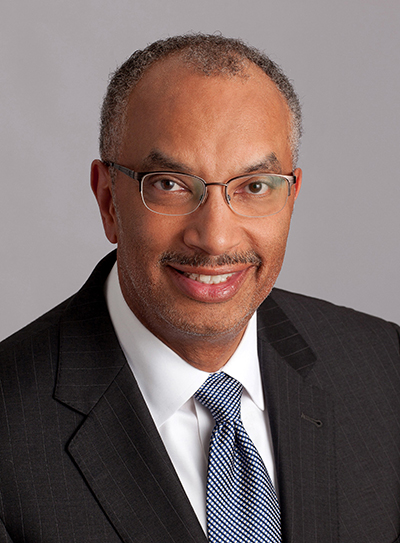Representing the Disadvantaged
Seymour James Jr., attorney-in-chief of the Legal Aid Society, recalls decades of work in public interest law.
 For 43 years, Seymour James Jr. (’74) has worked for the Legal Aid Society in New York. Driven by a passion to provide high-quality legal representation to disadvantaged New Yorkers, James began his long career in public interest law shortly after graduating from the Boston University School of Law in 1974.
For 43 years, Seymour James Jr. (’74) has worked for the Legal Aid Society in New York. Driven by a passion to provide high-quality legal representation to disadvantaged New Yorkers, James began his long career in public interest law shortly after graduating from the Boston University School of Law in 1974.
James began to consider public interest law as an undergraduate at Brown University. He attended a program for potential law students in Boston that emphasized “law as a vehicle for social change” before enrolling in the JD program at BU Law.
While in law school, he served as a summer intern for the Board of Corrections in New York City, which regulates “conditions of confinement and correctional health and mental health care in all City correctional facilities,” according to its website. There, James interviewed detainees about their legal representation. “I found that the vast majority of detainees were dissatisfied with the representation they were receiving,” he says.
Many detainees reported that they often didn’t see the attorneys representing them, even in court. For some, “every time they went to court, they saw a different lawyer,” he says, because “individual attorneys were not assigned to clients and didn’t seem to have time” to devote attention to each case.
Interning for the Board of Corrections reinforced James’s determination to work in indigent defense, specifically with the Legal Aid Society. “I came to the Legal Aid Society because I wanted to be able to provide high quality representation to my clients,” he says. “With each successive step I took, as I supervised more staff, I was able to increase the number of clients affected by my work.”
For nine years, James served as the attorney-in-charge of the criminal practice. The position came with its challenges. “Our caseloads in the criminal defense practice were enormous—almost twice the recognized standard,” he says. The problem was “exacerbated by the fact that New York at the time was engaged in broken-windows policing and stop-and-frisk [practices],” which placed more individuals in the criminal justice system.
“There weren’t enough resources to bring the caseloads down,” he says, noting additional challenges like the lack of investigators and social workers to dedicate the proper attention to each case.
“Ultimately, we were able to secure legislation… to reduce caseloads to an established level,” he says.
The Legal Aid Society worked with an independent law firm on a study to determine a manageable caseload. With input from that study, the chief administrative judge set a cap on the number of cases an attorney could be assigned.
The legislation, secured in 2009, “had a great impact on the caseloads we had,” reducing by almost half what was once a “triage practice” of 750 cases per year on average.
“Having that reduced caseload enabled attorneys to spend more time interviewing clients, interviewing witnesses, and doing research [on cases],” James says.
James’ time at the Legal Aid Society has been rewarding not only for the improvements he has made in addressing problems of indigent defense, but also for the positive relationships he forged with his clients.
Once, a client stopped his car to step out and thank him for his representation years before. Another client, who was involved in substance abuse when James represented him in court and helped him find a program for recovery, stayed in contact with James for “a number of years” before he passed away. “He used to keep in touch with me; he told me when he got married; and he sent me pictures of his kids,” James recalls.
Now, after devoting himself for more than four decades to advocating for high-quality legal representation for poor New Yorkers and ensuring that no one is deprived of representation because of poverty, he plans to retire.
James says he hopes to continue to practice law, albeit with more free time and less pressure with a lighter workload.
“I’m looking forward to spending a little more time with family,” he says, adding that he also hopes to read more for leisure.
“The job I’ve had has been pretty intense, you have to be on 24–7,” he says. Even so, “being a public interest lawyer is immensely rewarding.”
One of the keys to his success is passion. He advises recent and future graduates to consider their own interests and what excites them.
“Find an area of practice that you are passionate about,” he says, “because you’ll be thrilled to go to work every day, and you’ll be driven to secure your objectives.”
Reported by Kaya Williams (COM’20)
Related News
- BU Law Fellowships Help Graduates Launch Careers in Public Service
- Fighting the Good Fight: Jennifer Serafyn
- Michael A. Gollin (’84), Founder of the Public Interest Project, Remembered
- Stephanie Bonilla (’17) Awarded Equal Justice Works Fellowship